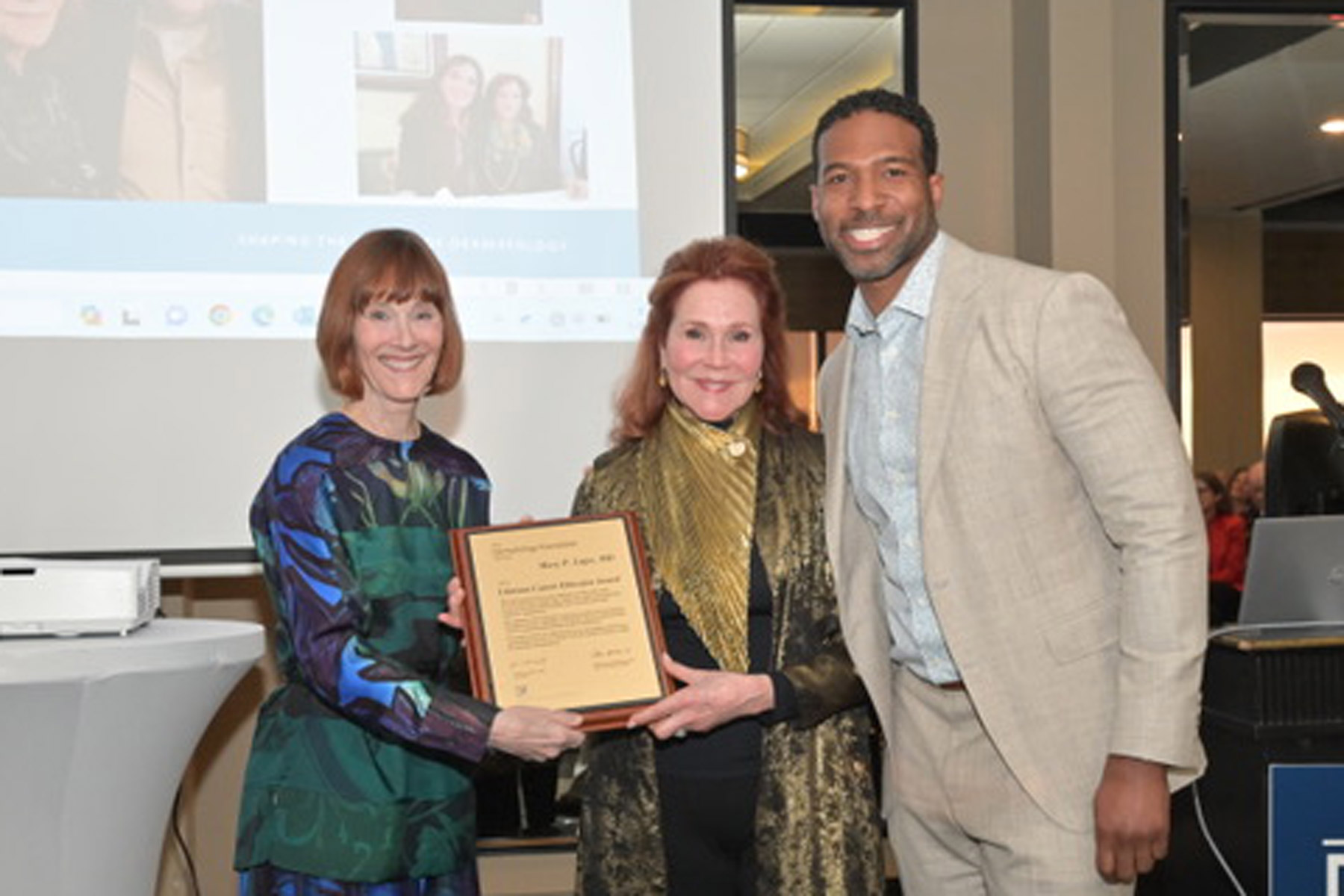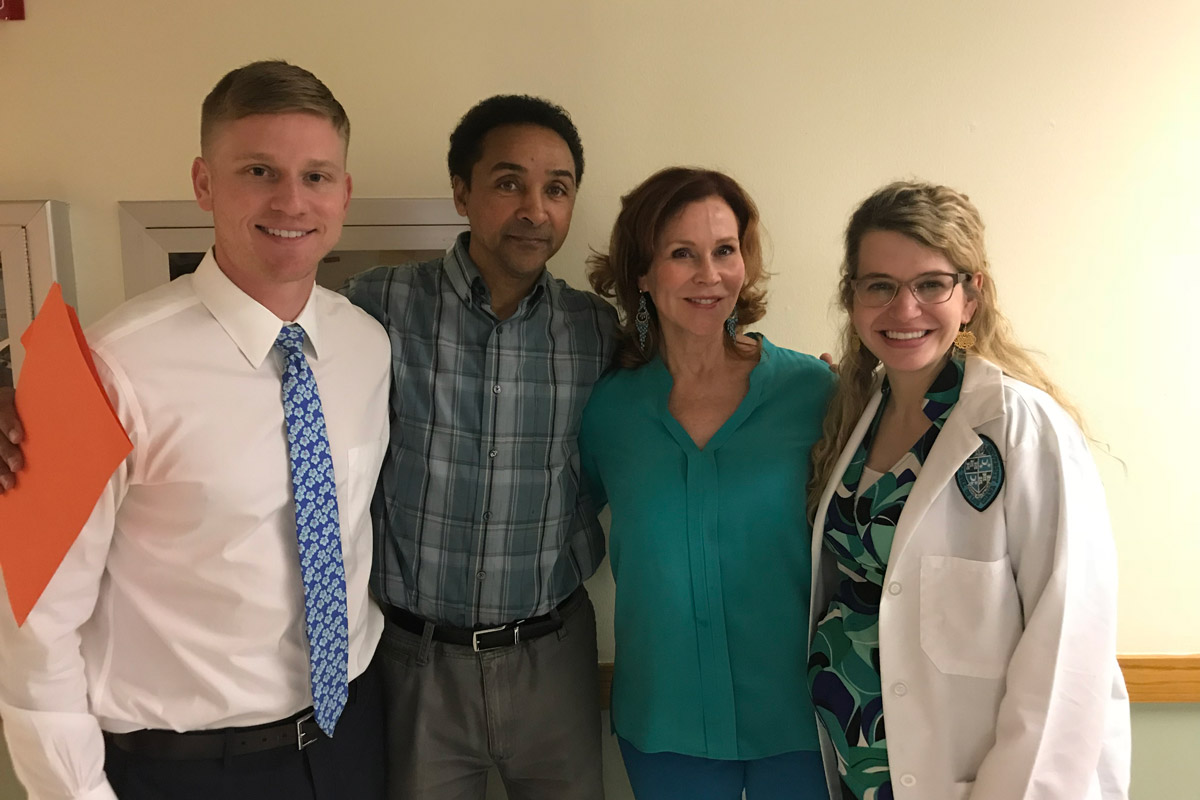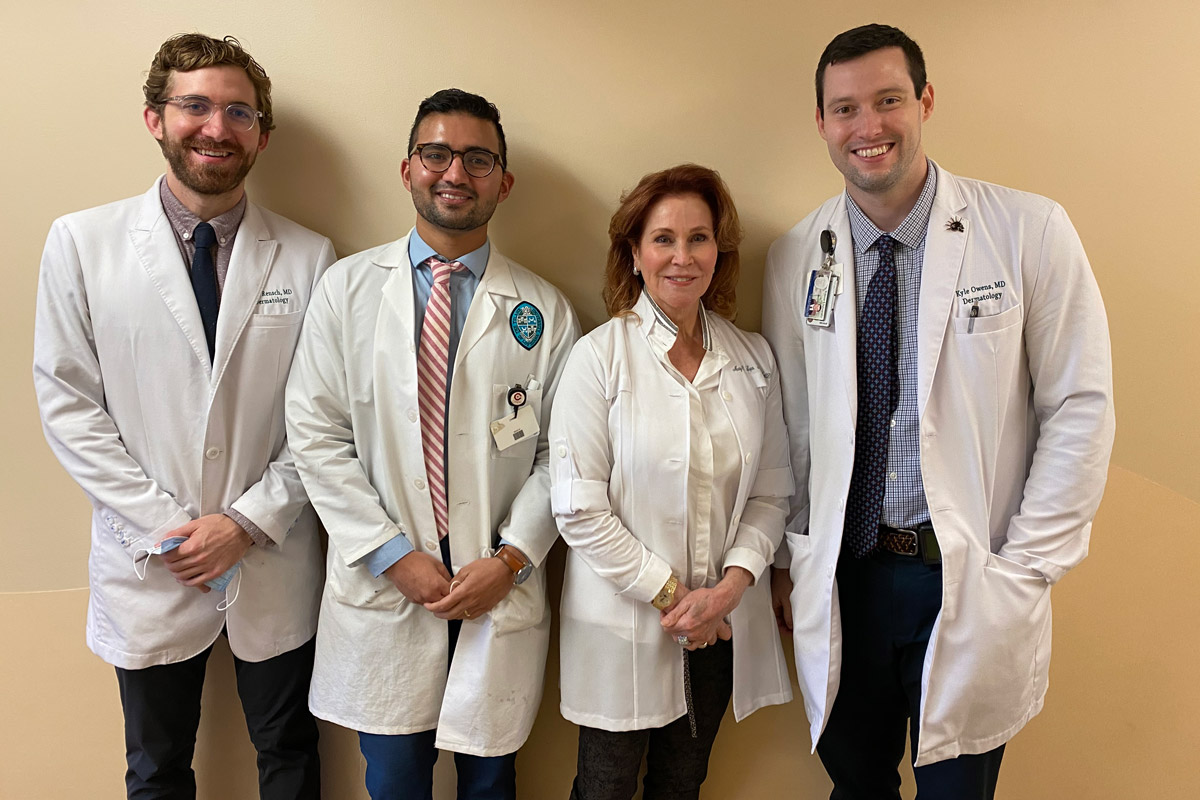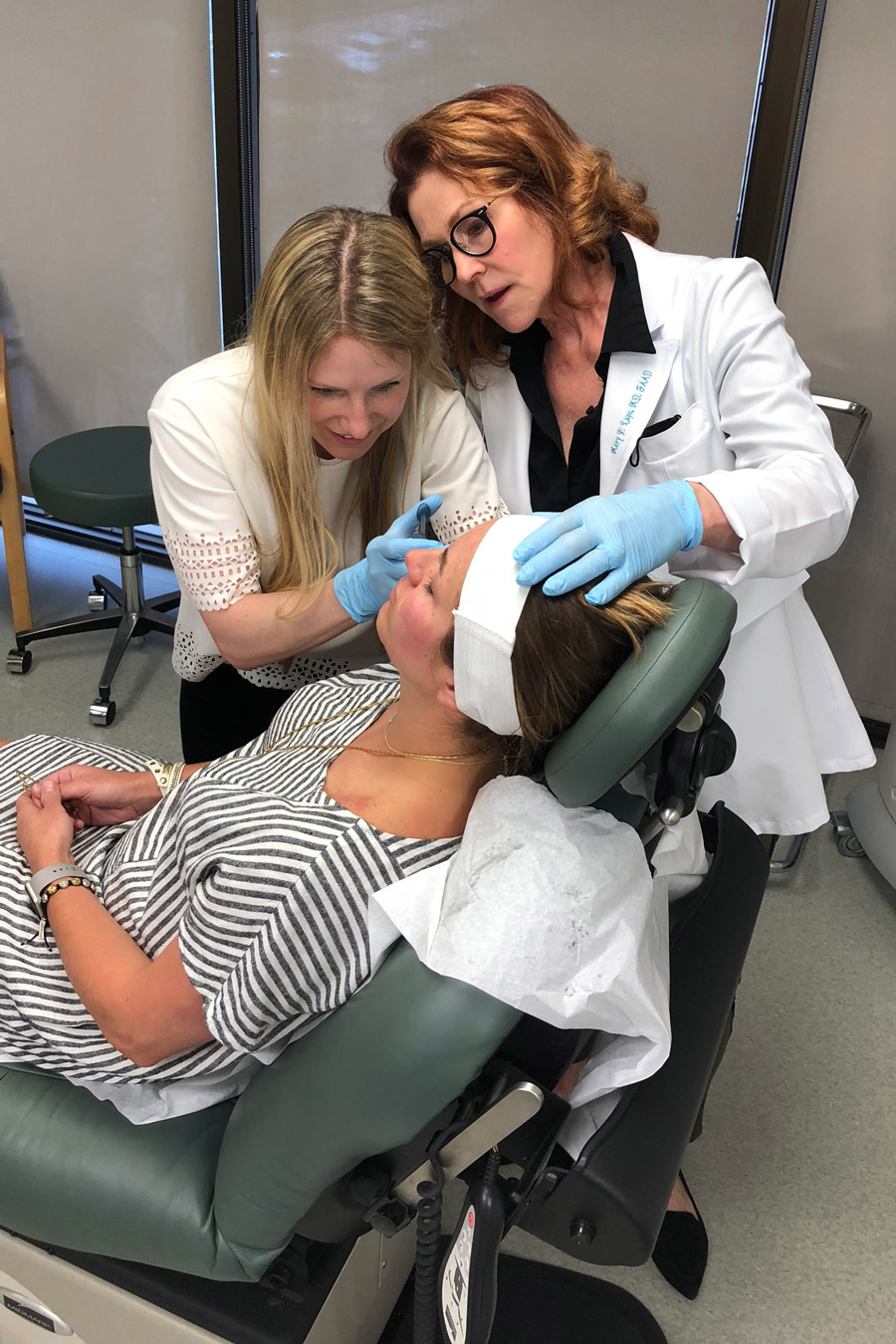The Art of Teaching Care Aesthetics
Mary M. Lupo, MD, 2024 DF Lifetime Career Educator Award
June 2024

For more than 40 years, Dr. Lupo has dedicated her career to a robust cosmetic dermatology practice in New Orleans, as well as teaching and mentoring dermatology residents and fellows.
“I’m honored to accept this award because the Foundation is so well-respected and their only agenda is to do good things for people,” Dr. Lupo said. “I’m also pleased to be recognized as a practical dermatologist who’s consistently oriented toward teaching patient care and the aesthetic side of dermatology.”
The Lifetime Career Educator Award honors a full-time academician who has dedicated their career to educating dermatology residents and fellows. They have a lifelong history of dedicated service as a mentor and role model for trainees in the department. The candidate should be known for their ability to enthusiastically impart knowledge, as well as inspire the student of dermatology to pursue a greater understanding of the specialty.
Dr. Lupo has had ideas of what’s possible in aesthetic care since she was a dermatology resident and transformed that vision into significant and lasting clinical teaching opportunities for residents. For those in her care she has always been attuned to the ways they want to look on the outside the way they feel on the inside.
“Most people get aesthetic procedures because one day the person they see in the mirror looks a lot older than they feel inside. It’s always been important to me to make people look better, ethically and with a natural outcome. Looking after patients, while ensuring safe outcomes and ethical care, are the main reasons I continue to teach.”
“It’s always been important to me to make people look better, ethically and with a natural outcome. Looking after patients, while ensuring safe outcomes and ethical care, are the main reasons I continue to teach.”
Dr. Lupo graduated from Tulane University School of Medicine in 1980. Among her many awards are the Tulane Medical Alumni Association Distinguished Service Award (2018), the American Society for Dermatologic Surgery Excellence in Education Award (2013), the Women’s Dermatologic Society (WDS) President’s Award (2010), Wilma Bergfeld WDS Visionary and Leadership Award (2024), and WDS Mentor of the Year Award (2014). Dr. Lupo was also president of the WDS (2007–2008).

Dr. Lupo created the resident cosmetic clinic when she was chief resident in dermatology at Tulane/Louisiana State University-affiliated hospitals.
Creating a resident cosmetic clinic at Tulane
This award will come as no surprise to the many medical students and residents Dr. Lupo has taught and mentored, beginning when she was chief resident in dermatology at Tulane/Louisiana State University-affiliated hospitals in 1983. At the time, residents routinely learned how to remove skin cancers, freeze warts, and recognize and diagnose skin manifestations of internal diseases. But the only aesthetic procedure being used was dermabrasion to non-surgically correct acne scars and deeper wrinkles. That was when Dr. Lupo learned of three innovative cosmetic procedures—dermal collagen injections, sclerotherapy, and chemical peels—and volunteered to create a resident cosmetic clinic to teach, practice, and perfect these new aesthetic procedures.

Dr. Lupo teaches residents from Tulane University how to look at a patient’s face, considering primarily balance and where to apply treatment to achieve a natural outcome.
She had the support and encouragement of the chair of the Department of Dermatology at Tulane, Dr. Larry Millikan. She also collaborated with other mentors on the Tulane faculty, particularly Dr. Elizabeth McBurney, chair of the DF Advisory Council, who was pioneering research using lasers for congenital hemangiomas.
“Dr. McBurney was a wonderful advocate for her residents, especially her fellow female residents,” Dr. Lupo said. “She showed me how important it is to correct external aesthetic defects, like a severe birthmark, so a child growing up won’t be ridiculed.”
After she graduated and started her private practice, she continued to teach at the clinic so it would continue to thrive. “I took a machete to clear a path, then encouraged others to follow me. We taught residents laser resurfacing instead of dermabrasion, botulinum toxin injections in addition to collagen filler, and hyaluronic acid injections and biostimulatory injections.”
Cosmetic Bootcamp

A fellow dermatologist receives 1-on-1 training from Dr. Lupo.
In 2005, Dr. Lupo co-founded with Dr. Ken Beer an annual CME course they called Cosmetic Bootcamp. This annual meeting is multidisciplinary, providing practitioners of the four key aesthetic specialties—dermatology, plastic surgery, facial plastic surgery, and oculoplastic surgery—with the opportunity to learn from each other. It’s the only training and education clinic that limits attendance to board-certified physicians and their staff.
“The aesthetic procedures research that other dermatologists and I have done, as well as Cosmetic Bootcamp, have raised the awareness among other specialties of the important contributions dermatologists make to aesthetic procedures. These procedures are no longer the sole domain of plastic surgeons.”
“You don’t renovate a house without blueprints”
Dr. Lupo believes her work is at the intersection of the science, art, and psychology of treatment. The science begins with an understanding of the anatomy of the treated area and includes FDA clinical studies for safety and efficacy, more than 30 of which she has participated in.
The art of the process involves teaching residents how to look at a patient’s face, considering primarily balance and where to apply treatment to achieve a natural outcome. She shows them how to use the tools, such as a laser or a needle, but believes it’s just as important to teach judgment and ethics.
She teaches residents how to look at a patient’s face, considering primarily balance and where to apply treatment to achieve a natural outcome. She shows them how to use the tools, such as a laser or a needle, but believes it’s just as important to teach judgment and ethics.
“Just as you don’t renovate a house without blueprints, you can’t start injecting until you have a plan,” she said. “Without a plan, you’re likely to haphazardly put treatments anywhere, possibly based on what the patient has asked for. They look in the mirror and are unhappy, but they don’t have a trained eye to know what they need. And when a doctor hasn’t been trained properly on how to achieve balance and harmony, a cosmetic procedure can have an undesirable result.”
The subjective part of the process considers the psychology of those treated and the sociology of treatment, including attitudinal differences related to ethnicity and race.
“You want to treat people who are fundamentally happy,” Dr. Lupo said. For those who are hoping a cosmetic procedure will make them happy—the person with OCD, body dysmorphia, or some other underlying psychological issue, for example—she tells them that treatment is unlikely to solve their problem and encourages them to seek social or psychological support.
Involvement with the Dermatology Foundation
“The Foundation has been a model organization for our specialty,” Dr. Lupo said. “A strong professional community like dermatology is housed in a big tent, with many different personalities involved. We need people who are political and willing to help the specialty in terms of reimbursement, dealing with the government, and with Medicare. We need those geared toward educating the next generation and outreach to the community. And we need those who are research oriented. Every part of that tent should be made to feel valued and important to the specialty.”
“The Foundation has been a model organization for our specialty.”
Dr. Lupo has supported the Foundation both as a volunteer and a donor. She joined the Leaders Society in the 1990s when she began making regular contributions to support the Foundation’s goal of funding the groundbreaking research of promising young investigators. She later became a member of the Annenberg Circle (AC), and most recently became a Sustaining member by joining other AC members who donate at least $5,000 per year to support research.
For Dr. Mary Lupo, in addition to financial support, her lifetime devoted to teaching and patient care is what she has contributed.

